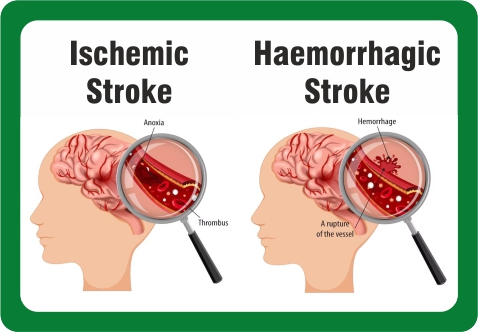BRAIN STROKE
- Thrombotic Stroke:This type occurs when a blood clot forms in one of the arteries supplying blood to the brain. The clot usually forms in a narrowed artery damaged by plaques build up in the artery.
- Embolic Stroke: An embolic stroke happens when a blood clot forms away from the brain, usually in the heart and then travels and lodges in one of the brain’s arteries.
- Sudden confusion or difficulty in understanding.
- Difficulty in speaking or incohesive, distorted speech.
- Weakness or numbness in the face, arm, or leg.
- Difficulty in walking or maintaining balance.
- Intracerebral Haemorrhage: when a blood vessel in the brain ruptures, this type of stroke takes place and it results in leakage of blood into the surrounding brain tissues. High blood pressure is a common cause of this type of stroke..
Subarachnoid Haemorrhage: This type involves bleeding in the space between the brain and the surrounding membrane. It is often caused by the rupture of a weakened blood vessel, known as an aneurysm
- Severe headache.
- Nausea or vomiting.
- Vision changes.
- Weakness or numbness.
- Speech Difficulties: Communication challenges may arise, ranging from incohesive, distorted speech to the inability to speak or understand language.
- Numbness or Pain: Persistent numbness or pain, especially on one side of the body.
- Paralysis: Brain Stroke can cause partial or complete paralysis, generally affecting one side of the body.
- Memory and Cognitive Issues:Stroke can impact memory, thinking, and overall cognitive function.
- Emotional Consequences: After stroke, some emotional problems such as depression, anxiety, or mood swings may take place.
Smoking damages blood vessels, accelerates clot formation, while Alcohol raises blood pressure, contributing to irregular heartbeats and increases stroke risk. So, both these need to be totally avoided.
Arnica is most suitable in stroke due to trauma. It helps in reducing bruising, swelling, and inflammation in the affected areas of the brain.
Belladonna is beneficial when symptoms appear suddenly and intensely. Red face, red eyes, throbbing headaches, high fever, and sensitivity to light are some of its indicative symptoms.
It is indicated in symptoms such as difficult swallowing, speech issues, and paralysis of the left side.
when emotional trauma accompanies the physical effects of a stroke. It is suitable in anxiety, fear, and hallucinations that can arise during the recovery process.
Secale cor is used to improve vascular health and circulation. It is beneficial in preventing and addressing complications related to blood flow.
This is best suited medicine for stroke that takes place in Alcoholics
Most suitable when lower jaw gets hang down.
Used in paralysis of various groups of muscles around the eyes, throat, chest, larynx, sphincter , extremities etc.
Remarkable medicines for changeable mood, silent brooding, sad, tearful, non- communicative, after effects of shocks, grief and disappointment.
This is an important medicine for palpitation with anxiety, fainting, and tingling in fingers, affections of heart with pain in the left shoulder, icy coldness and insensibility of hands and feet, arms, hip joint and thigh feel lame, hot hands and cold feet.
Used for oversensitive persons, even slight noises are unbearable, weakness merely from speaking or walking, pallor of skin, Heart contracts suddenly filling the blood vessels and then suddenly skin becomes pale.
Suitable in case of fatty degeneration of blood vessel and every tissue and organ of the body, loss of memory, feeling as if something was creeping out of every corner, oversensitive to external impressions, arms and hands become numb, worse lying on the left side, can lie on the right side only, joints suddenly give way.
Suitable in case of weak memory, very sensitive to noise, repeats everything said to him, forehead cool base of brain hot, burning along the spine, nape of neck weary from writing or any exertion, feet in continuous motion, can not keep still,
Most suitable in insomnia, restless and wakeful. It has a quieting effect on the nervous system and produces normal sleep.
According to symptoms, any one from the above medicines can be administered even before reaching hospital and after discharge from the hospital also. After discharge, Homoeopathic medicines shows wonderful substantive results faster than Allopathic medicines. For complete treatment after discharge from the hospital consultation and guidance of a good homoeopath must be taken.
